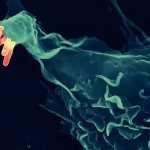Lien vers Pubmed [PMID] – 19165331
PLoS Pathog. 2009 Jan;5(1):e1000271
Shigella, the causative agent of bacillary dysentery, invades epithelial cells by locally reorganizing the actin cytoskeleton. Shigella invasion requires actin polymerization dependent on the Src tyrosine kinase and a functional bacterial type III secretion (T3S) apparatus. Using dynamic as well as immunofluorescence microscopy, we show that the T3S translocon component IpaC allows the recruitment of the Src kinase required for actin polymerization at bacterial entry sites during the initial stages of Shigella entry. Src recruitment occurred at bacterial-cell contact sites independent of actin polymerization at the onset of the invasive process and was still observed in Shigella strains mutated for translocated T3S effectors of invasion. A Shigella strain with a polar mutation that expressed low levels of the translocator components IpaB and IpaC was fully proficient for Src recruitment and bacterial invasion. In contrast, a Shigella strain mutated in the IpaC carboxyterminal effector domain that was proficient for T3S effector translocation did not induce Src recruitment. Consistent with a direct role for IpaC in Src activation, cell incubation with the IpaC last 72 carboxyterminal residues fused to the Iota toxin Ia (IaC) component that translocates into the cell cytosol upon binding to the Ib component led to Src-dependent ruffle formation. Strikingly, IaC also induced actin structures resembling bacterial entry foci that were enriched in activated Src and were inhibited by the Src inhibitor PP2. These results indicate that the IpaC effector domain determines Src-dependent actin polymerization and ruffle formation during bacterial invasion.


